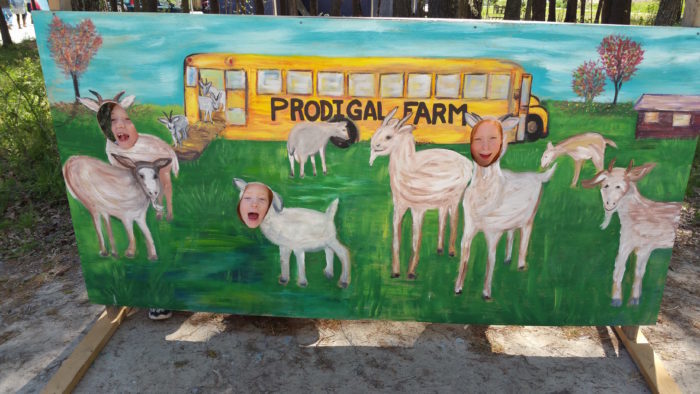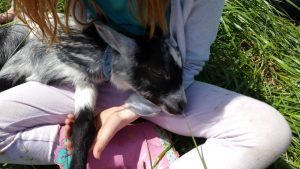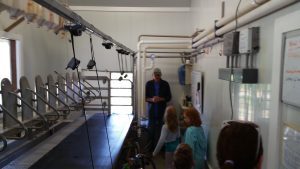
Due to so many people living in urban areas, we often get stuck in a rut of only focusing on community programs within the city… Well, what about outside of the city limits? There’s a whole new world to explore, and programs to attend (Cue Fields of Dreams music). Now, just like in the movie, imagine corn fields all around you and visualize what I am about to say in a whisper, If you provide it, they will come. What do you mean?… If I provide what, who will come?… (Once again, you hear in a whisper)… If you provide it, they will come.
No… I’m not talking about an Iowa farm with a baseball field in it, but rather an amazing family friendly goat and cheese farm in Bahama, North Carolina that my family and I recently had the privilege of visiting. About five or six times a year they open their doors…errr… gates to anyone who wants to make the trek to this 95 acre playground for a day. Staffed by local volunteers, the farm, at no cost mind you, let’s all generations experience the magic of getting their hands and clothes dirty. They offer tours of the farm as well as classes on soap making and blacksmithing, but the most enchanted moment of all is holding baby goats, or “kids,” if we are being technical.
Dave Krabbe and Kat Spann, co-owners of Prodigal Farms are using grassroots leadership at its best for their business and the community. The farm does an remarkable job of sharing its assets such as the land that they let the people run around on, the goats they allow the community to play with, and the greatest asset is the knowledge they share with anyone who asks. In my opinion, the sharing of knowledge has created an amazing model for sustainability at Prodigal Farms and is a testament to the vision the owners had. The very same people they are sharing all of their knowledge with become loved volunteers. The farm is then able to mobilize their volunteers and bring the new knowledge that they just learned along with the other skill sets of these people to help transform the farm, as well as the community around it. Walking away from an experience like that gives you a wonderful sense of social goodwill that you can take back to your own neighborhood. Each time the farm does one of these special events, its building relationships, and growing its volunteer base, which in turn will make the event days sustainable. These opportunities also open the doors for other groups they may not have had the opportunity to work with before, such as Boy and Girl Scout troops, Active Adult Community Centers, or plain old city slickers who have never set foot on a farm (watch your step by the way.)

I think it’s important to ask why these farm events are so popular and successful when so many other programs and events fail… I feel the reason they are so successful is because the farm understood the importance of a shared vision. We all have been to a program where you walk away from it going… Well I know the event programmers spent about five minutes planning that. You become disappointed that you wasted your time and money going to something that you didn’t learn anything from, or even have fun at. Why? Why was the program so bad? Because they lacked vision, or worse, didn’t take time to figure out what the vision was. Without that knowledge, you are dooming yourself to be unsuccessful.
When planning a program, or working towards unity in a community, there are a few steps to work towards to attain a shared vision, and thanks to the work done by the Neighborhood Reinvestment Training institute, I have five of them for you.
- Keep your eyes on the prize! Just before Dave and Kat set upon this life changing journey, they were in New York City. They were tired of the rat race; they wanted more from life, so they had the courage to stop and follow a crazy idea… a vision of the future they could have, that a whole community could have. The vision was to be amazing cheese makers and be environmentally friendly in the process too. It was this idea, this shared vision that kept them moving forward when there were bumps in the road.
- Vision helps develop strategic plans. The vision is everything–the creativity, the goals, the mission, and tactics that will be used to keep you on track to the future. Whenever you get lost, you can fall back on the vision to see if the direction you are headed in, and make sure that the decisions you are making still makes sense.
- It Motivates and Inspires us. Often, I feel we are so worried about the bottom line of spending, or being ultra-safe so we don’t get sued, that we become too scared to use our vision. We poo-poo things too quickly, because the powers that be say we shouldn’t do that because we may lose our shirt. We need to let some of that go… We must understand that there is, and always will be some inherent risk in everything we do. We need to stay focused on a clear, positive picture of the future that will help motivate community residents, children, teachers, parents and ourselves. Knowing that there is a positive future inspires us to work hard and say focused and throw a bit of caution to the wind.
- It connects us to each other. A shared vision helps us remember we are all going to the same place. Having the same destination will help Dave and Kat with daily disagreements on the farm. The same can be said when working with or in a community. The shared idea or goal, lets us know what connects us is more important than what separates us.
- It connects us with a broader Movement. Being on the farm with my family was amazing. My kids had life learning experiences, as a matter of fact, so did I. We gained a better understanding on the environment, where cheese and milk come from, how to properly hold a baby goat, what 95 acers of land looks like, and most importantly, we learned these things through the vision of Dave, Kat, and all of the other volunteers at Prodigal Farms. This Idea from the authors of the NeighborWorks Program falls in line with the idea that “When we all engage in developing a clear image, we are all agreeing on where we want to go, or where we are willing to be taken to.” This will allow all the people involved in the work to move together. Whether these people are in the city, or on a farm, a shared vision will allow you to coordinate efforts and collaborate on the end product…
Now is the time to get out in your neighborhood, community, or wherever your heart takes you, and experience something new. Something you haven’t tried before. Allow yourself the opportunity to be swallowed up by the person who is running the program’s shared vision, and see where it takes you!
Let me ask you a question… Do you have any fantastic programs or experiences in your area that we should know about? What is it, and why is it special to you and your community?
Dan – thanks. Nice to take the specifics of your visit to Prodigal Farms and pull back for some lessons or guideposts for community building in general.
Two things to keep the conversation going:
Instead of replying to your request for fantastic programs or experiences similar to yours at Prodigal Farms, I’d like to see if there are effective “reverse” efforts where people from more rural areas visit and learn about a city neighborhood, program or initiative.
Maybe that seems silly. I think most urban-located folks assume that “the country folk” have to come to the city: for major shopping, to visit family, to enjoy big sports or cultural events. Your story is a good one: about how city folks can learn and appreciate the farm and community setting of rural life (at least as shown via the vision of Prodigal Farms).
But are there examples of a reciprocal arrangement?
The second thing is to help readers compare your great vision of outreach, volunteer work and community building with earlier blog posts (I could cite several, but I’ll limit it to three):
Building Community across Language Barriers
http://cele.sog.unc.edu/building-community-across-language-barriers/
The Power of Small
http://cele.sog.unc.edu/the-power-of-small/
Cottage Grove for LIFE! Greensboro Neighborhood Redevelopment
http://cele.sog.unc.edu/cottage-grove-for-life-greensboro-neighborhood-redevelopment
My site is dedicated to empower people looking for information on goats. We do not directly have events that happen in our community, but do promote people to learn about goats and how to register and care for them. We aim to promote great education in all aspects of buying to selling them. This may not be a direct experience to us, but does allow a better experience raising these great animals and benefits many communities due to this knowledge. You can find out more at http://goatsunlimited.com
Another interesting community service that farms can provide are enriching after school programs and camps, as for example Spence’s farm in Chapel Hill.